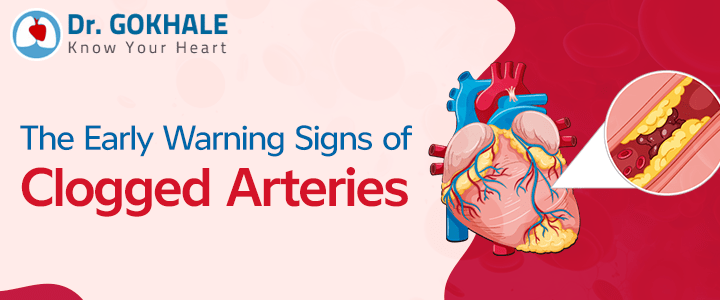Clogged arteries develop when fatty deposits, cholesterol, and other substances accumulate on the walls of your arteries, gradually hardening and narrowing them.
This accumulation restricts blood flow of oxygen-rich blood to vital organs and tissues, causing pain, triggering serious complications like peripheral artery disease, heart attack, stroke, and when not promptly treated – death.
Recognizing the early warning signs and symptoms of clogged arteries is crucial for timely intervention and preventing these potentially life-threatening conditions. So with inputs from the top cardiologist in Hyderabad, Dr Alla Gopala Krishna Gokhale, let’s explore, ways to identify and prevent heart disease by recognising the early warning signs of clogged arteries. Read on:
Warning Signs of a Clogged Artery
Identifying the symptoms of clogged arteries is vital for early detection and prevention of serious complications. Common symptoms of clogged arteries include:
- Chest Pain (Angina): One of the first signs of clogged arteries is chest pain or discomfort, also known as angina. This pain may feel like pressure, tightness, or a squeezing sensation in the chest, often triggered by physical strain or stress.
- Shortness of Breath: When the heart is unable to pump enough blood to meet the body’s demands it leads to breathlessness, which is another common symptom of clogged arteries.
- Fatigue: Weakness and fatigue symptoms result from reduced blood flow to the brain and muscles, making everyday activities more challenging.
- Pain in the Extremities: Pain, numbness, or weakness in the arms or legs can be a sign of peripheral artery disease, a condition related to clogged arteries.
- Heart Palpitations: Irregular heartbeats or a racing heart can be associated with inadequate blood supply to the heart.
- Dizziness or Light-headedness: Reduced blood flow to the brain due to clogged arteries can cause dizziness, fainting, or a feeling of light-headedness.
- Sweating and Nausea: Severe sweating and nausea are warning signs of a heart attack, particularly when accompanied by chest pain.
Causes of Clogged Arteries:
The following are some of the factors that cause clogged arteries to develop:
- High Cholesterol: Elevated levels of LDL cholesterol (bad cholesterol) can lead to plaque formation in the arteries.
- Hypertension (High Blood Pressure): High blood pressure can damage the artery walls, making them more susceptible to plaque build-up.
- Smoking: Tobacco smoke damages the arteries, promoting the accumulation of fatty deposits.
- Diabetes: High blood sugar levels can accelerate the hardening of the arteries.
- Obesity: Excess body weight contributes to various risk factors, including high cholesterol and hypertension.
- Sedentary Lifestyle: Lack of physical activity can also increase the risk of clogged arteries.
- Unhealthy Diet: Diets high in saturated fats, transfats, and processed foods contribute to plaque formation.
- Genetics: Family history of heart disease can increase the likelihood of developing clogged arteries.
Diagnosing Clogged Arteries:
Early detection of clogged arteries is crucial for preventing severe cardiovascular events. Diagnostic approaches include:
- Blood Tests: Measuring cholesterol levels, blood sugar, and other markers can help assess the risk of atherosclerosis.
- Electrocardiogram (ECG): Records the heart’s electrical activity to detect abnormalities.
- Stress Test: Monitors heart function during physical exertion to identify potential blockages.
- Echocardiography: Uses ultrasound to visualize the heart and detect plaque
- Angiography: A specialized X-ray procedure that provides detailed images of the arteries to identify blockages.
Treatment Options for Clogged Arteries
Treatment for clogged arteries focuses on reducing symptoms, preventing further plaque build-up, and minimizing the risk of heart attacks or strokes. Common treatments include:
- Lifestyle Modifications: Adopting a heart-healthy lifestyle, including a balanced diet, regular exercise, quitting smoking, and managing stress.
- Medications: Statins to lower LDL cholesterol, antihypertensive to control blood pressure, and antiplatelet drugs to prevent blood clots.
- Angioplasty and Stenting: A minimally invasive procedure to open blocked arteries and insert a stent to keep them open.
- Coronary Artery Bypass Grafting (CABG): Surgery to create a bypass around clogged arteries using vessels from other parts of the body.
Understanding the symptoms and causes of clogged arteries is crucial for proactive heart health. Early awareness can make all the difference in managing risk factors like cholesterol or considering advanced treatment options. In some cases, patient may still be at risk even after following a healthy lifestyle which is sign for the need of more advanced heart treatment and care.
Dr. Alla Gopala Krishna Gokhale is India’s leading cardiologist with an exemplary track record in treating heart-related conditions using both non-surgical and surgical approaches. If you are in Hyderabad and looking for advanced treatment for clogged arteries or other heart-related conditions, you can contact him here.
 Ask Doctor
Ask Doctor
